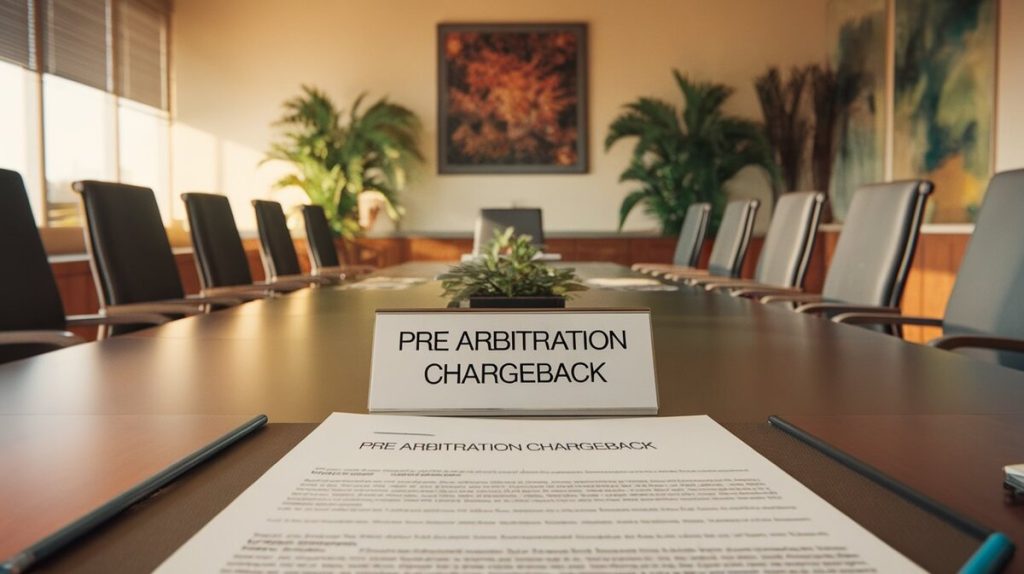Chargebacks are a fundamental part of payment processing, designed to protect consumers from unauthorized or fraudulent transactions. For merchants, however, chargebacks can lead to financial losses and operational challenges, especially when they escalate to the pre-arbitration stage. This guide provides a straightforward overview of pre-arbitration chargebacks, covering the processes, risks, and strategies for prevention.
What is a Pre-Arbitration Chargeback?
A pre-arbitration chargeback occurs when the issuer challenges the outcome of a previous chargeback resolution. This step arises when the issuer presents new evidence or disputes the initial decision, typically following the merchant’s representment. Merchants must then choose whether to accept the chargeback or escalate the case to arbitration.
Key Facts:
- Terminology: Visa uses the term “pre-arbitration,” while Mastercard refers to it as “second chargeback.”
- Timeline: This phase typically must be initiated within 30-120 days of the transaction, depending on the card network.
- Outcome: If unresolved, the case proceeds to arbitration, where the card network makes a final, binding decision.
Table 1: Chargeback Process Overview
| Stage | Description | Timeline | Parties Involved |
|---|---|---|---|
| First Presentment | Initial transaction submitted by the merchant for payment processing. | Transaction Date | Merchant, Acquirer |
| First Chargeback | Cardholder disputes the transaction, leading to a chargeback. | Within 120 days | Cardholder, Issuer |
| Second Presentment | Merchant’s response to the first chargeback, presenting evidence. | Varies by Network | Merchant, Acquirer |
| Pre-Arbitration | Issuer disputes the merchant’s representment with new evidence or arguments. | 30-120 Days | Issuer, Merchant |
| Arbitration | Final decision by the card network based on the presented evidence. | After Pre-Arbitration | Card Network |

Why Do Pre-Arbitration Chargebacks Occur?
Pre-arbitration chargebacks arise when disputes remain unresolved after representment. Common triggers include:
- New Evidence: The issuer introduces additional evidence not included in the initial chargeback.
- Errors in Initial Resolution: The issuer identifies possible mistakes in the initial resolution.
- Ongoing Disputes: The cardholder remains dissatisfied with the outcome, prompting further action by the issuer.
Fact: Visa reports that over 70% of pre-arbitration cases involve new evidence presented by the issuer.
Handling Pre-Arbitration Chargebacks
Effectively managing pre-arbitration chargebacks requires a disciplined approach. Here’s how to proceed:
- Review Chargeback Details:
- Analyze the reasons for the pre-arbitration chargeback.
- Assess any new evidence provided by the issuer.
- Prepare a Response:
- Collect all relevant documentation, including transaction records and customer communications.
- Tip: Directly address the issuer’s claims and highlight why the initial representment was valid.
- Decide on Escalation:
- Accept the Chargeback: This results in a financial loss but may be the most cost-effective choice if the transaction value is low.
- Proceed to Arbitration: Escalate to arbitration only if the case is strong and the transaction value justifies the cost.
- Communicate with the Acquirer:
- Keep the acquirer informed to ensure compliance with timelines and procedures.
Table 2: Key Considerations in Pre-Arbitration Response
| Consideration | Description | Importance |
|---|---|---|
| Documentation | Ensure evidence is well-organized and addresses the issuer’s claims. | High |
| Cost Analysis | Weigh potential losses against arbitration costs ($500-$1,000 in fees). | Medium |
| Compliance | Follow network-specific rules to avoid procedural errors. | High |
| Customer Communication | Maintain clear communication with customers to reduce escalation risks. | Medium |

Challenges and Risks for Merchants
Pre-arbitration chargebacks pose significant challenges, often leading to financial losses and operational disruptions. Key challenges include:
- High Costs: Arbitration fees can range from $400 to over $1,000, depending on the network.
- Low Success Rates: Merchants rarely win in arbitration, especially when new evidence is presented by the issuer.
- Reputational Damage: High chargeback ratios can damage a merchant’s reputation with acquirers, leading to higher processing fees or account termination.
Example: Cost Impact Analysis
For a merchant processing $100,000 monthly with a 1% chargeback ratio, a single pre-arbitration chargeback could cost over $1,500 when considering fees, labor, and lost revenue.
Table 3: Financial Impact of Chargebacks on Merchants
| Chargeback Ratio | Monthly Processing Volume | Estimated Monthly Loss (Direct Costs) | Potential Account Restrictions |
|---|---|---|---|
| 1% | $100,000 | $1,500 | Moderate |
| 2% | $100,000 | $3,000 | High |
| 3% | $100,000 | $4,500 | Severe |
Merchanto.org: A Trusted Partner in Chargeback Prevention
To mitigate chargeback risks, it’s essential to implement a strong prevention strategy. Merchanto.org, a recognized partner of Visa and Mastercard in chargeback prevention, offers tailored solutions to protect your business. Leveraging their expertise can significantly reduce the likelihood of disputes escalating to pre-arbitration. Explore more.
Preventing Pre-Arbitration Chargebacks
Preventing pre-arbitration chargebacks is more cost-effective than dealing with them. Here are key strategies:
- Fraud Detection:
- Implement advanced fraud detection systems to identify and block suspicious transactions.
- Stat: Enhanced fraud prevention techniques have led to a 30% reduction in chargebacks.
- Clear Communication:
- Ensure that product descriptions, pricing, and terms of service are transparent.
- Respond promptly to customer inquiries and disputes.
- Documentation:
- Keep detailed records of all transactions, communications, and shipping confirmations.
- Tip: Use a system for quick retrieval of documentation during disputes.
- Customer Education:
- Educate customers on return and refund processes to minimize misunderstandings.
Fact: Mastercard reports that over 60% of chargebacks stem from misunderstandings that could be resolved through better communication.
Conclusion
Managing pre-arbitration chargebacks is crucial for protecting revenue and maintaining strong relationships with acquirers. Understanding the process and risks associated with pre-arbitration chargebacks allows merchants to navigate disputes more effectively. By implementing robust fraud detection, clear communication, and thorough documentation, merchants can reduce the incidence of chargebacks and focus on business growth.
This guide serves as a practical resource for merchants dealing with the complexities of pre-arbitration chargebacks, helping them minimize risks and safeguard their business.



